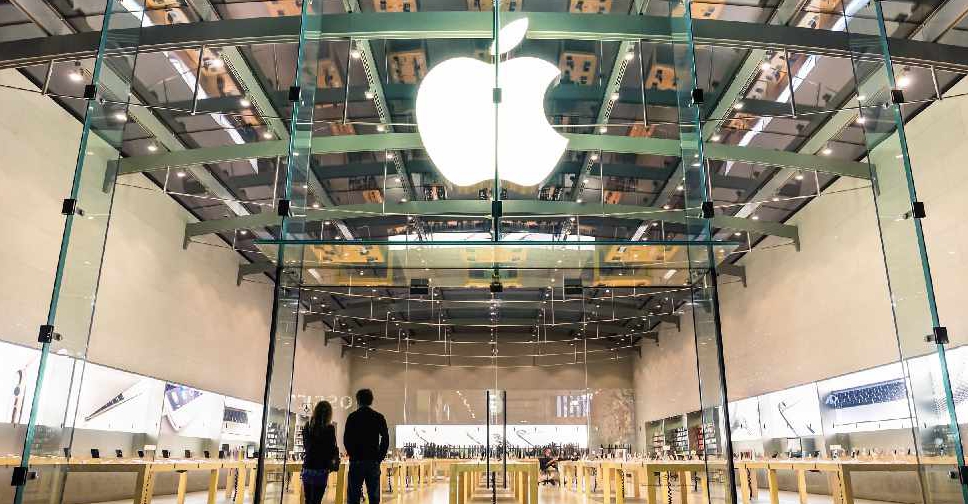
Apple Inc has forecast that revenue would fall for a second quarter in a row but that iPhone sales were likely to improve as production had returned to normal in China after COVID-related shutdowns.
While striking an optimistic tone on sales of services and iPhones, CEO Tim Cook said an uncertain economy is expected to hurt categories like gaming and digital advertising.
Overall, Apple's leaders tried to reassure investors that despite the firm being buffeted by up-and-down sales cycles for its flagship device and vulnerable to supply chain shocks, the world's largest listed company remains on a steady - if somewhat slower - rise. And in the immediate aftermath of some of the company's worst financial results in years, at least some investors seemed to give Cook the benefit of the doubt, imposing only modest share price declines.
For the just-ended quarter, Apple's profits missed Wall Street expectations for the first time since 2016, dragged down by iPhone sales falling for the first time since 2020.
The stock was down about 2 per cent after Chief Financial Officer Luca Maestri said that iPhone sales were likely to improve compared with the quarter ended December 31. That did not quite erase a 3.7 per cent gain during regular trade.
Amazon.com and Alphabet also fell about 4 per cent after reporting results. They also had gained during regular trade.
SALES, PROFITS MISS EXPECTATIONS
Apple sales fell 5 per cent to $117.2 billion and were down in every part of the world in the quarter. Sales from each product category dropped, except for gains in services and iPads. Earnings per share were $1.88.
Analysts had expected sales of $121.1 billion and profits of $1.94 per share, according to IBES data from Refinitiv. In an interview, Cook told Reuters that the production disruptions that plagued Apple's key quarter were now over.
"Production is now back where we want it to be," he said.
During its fiscal first quarter ended December 31, Apple faced a wave of challenges that left Wall Street expecting lower sales. Chief among those were supply chain pressures when COVID lockdowns at a production facility in Zhengzhou, China, slowed production of iPhone 14 Pro and Pro Max devices, both premium priced models that would traditionally help drive Apple's margins higher.
Cook said the lockdowns in China created a dual challenge where both supply and demand were constrained, with greater China sales falling 7 per cent to $23.9 billion.
But product snags are behind Apple now. "They still feel demand will be soft, but they've rectified production, which means that if demand does go up unexpectedly, they can ramp" to meet it, said Ben Bajarin of analyst firm Creative Strategies.
FOREIGN EXCHANGE HEADWINDS
The strong US dollar also hurt Apple, which derives more than half its sales from outside the Americas, but the effect was less than anticipated as the dollar eased from last year's highs. Apple had warned investors that such foreign-exchange issues would put a 10 per cent on drag on sales but said on Thursday that the actual effect was 8 per cent. Apple expects a 5 per cent impact for foreign exchange rates in the fiscal second quarter.
"I would point out that 8 per cent is still a very severe headwind," Cook told Reuters. "I wouldn't want to underestimate that. We would have grown on a constant currency basis."
On top of supply chain problems for the iPhone, Wall Street analysts had expected iPhone sales to fall this year as part of a larger pattern in which the iPhone 14 family released last year sells more slowly after two straight years of strong sales of iPhone 12 and 13 models. Apple said iPhone sales were $65.8 billion, down 8 per cent from the year before and the first fall since 2020.
ONLY TWO GROWTH SEGMENTS
Only two segments grew. The company's services segment, which includes content businesses such as Apple TV+ and software business like the App Store, rose 6 per cent to $20.8 billion in revenue. And sales of the iPad were up 30 per cent to $9.4 billion, compared with analyst expectations of $7.8 billion, according to Refinitiv data.
"The report was not good. The guidance wasn't great either. But it doesn't seem to matter. This market has just a relentless 'buy the dip' mentality," said Dennis Dick, a trader at Triple D Trading who does not have a position in Apple stock.
Cook told Reuters that the company now has a base of 2 billion active devices, up from 1.8 billion a year ago. The company also has 935 million paid subscriptions, up from 900 million the quarter before, and that services sales set a record in several markets, including China, he said.
Sales of the company's Mac computers, which had boomed during the wave of working from home during the pandemic, declined 29 per cent year over year to $7.7 billion. The wearables and accessories segment, which includes the Apple Watch and AirPods, fell 8 per cent to $13.5 billion.

 MBRSC, 'Thales Alenia Space' partner on Lunar Gateway project
MBRSC, 'Thales Alenia Space' partner on Lunar Gateway project
 Gulfood 2025 to celebrate landmark 30th edition
Gulfood 2025 to celebrate landmark 30th edition
 UAE-Kuwait Week kicks off in Dubai
UAE-Kuwait Week kicks off in Dubai
 Samsung E&A wins $1.7 bln contract for UAE methanol plant
Samsung E&A wins $1.7 bln contract for UAE methanol plant
 OpenAI announces new 'deep research' tool for ChatGPT
OpenAI announces new 'deep research' tool for ChatGPT




